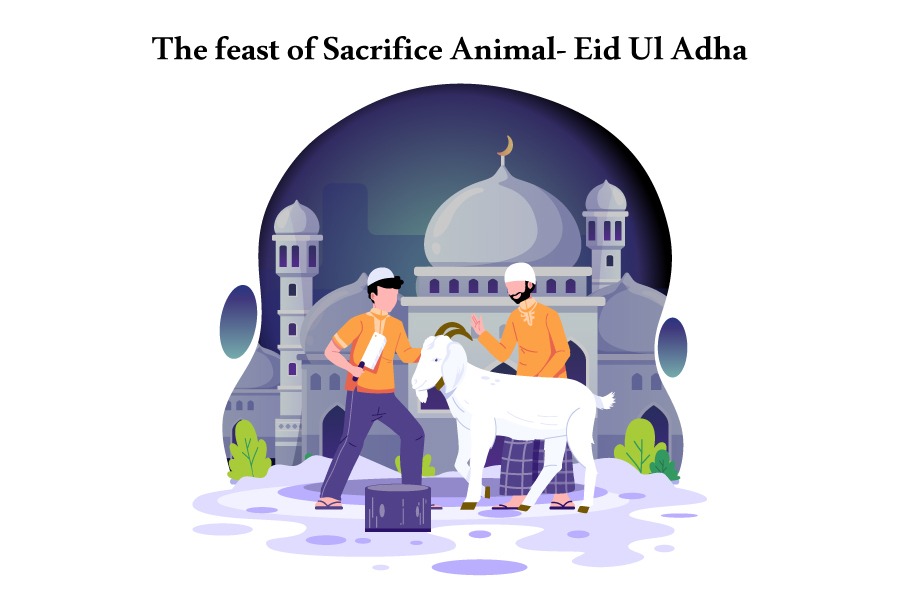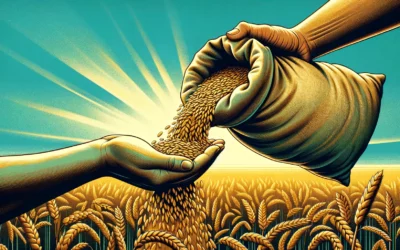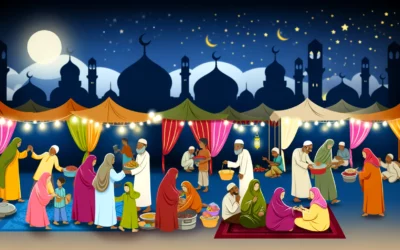Understanding the various practices and traditions of animal sacrifice in Islam requires delving into complex histories and philosophies. Animal sacrifice holds significant ritualistic importance deeply embedded in Islamic tradition. In the article, we will explore the historical origins, philosophy, significance, and benefits of animal sacrifice in Islam while addressing common misconceptions.
Why do Muslims Sacrifice Animals?
According to Islamic tradition, Muslims sacrifice animals as a commemoration of Prophet Ibrahim’s devotion and willingness to fulfill Allah’s command. Prophet Ibrahim was tested by Allah, who commanded him to sacrifice his beloved son, Ismail. Demonstrating unwavering faith, Prophet Ibrahim submitted to Allah’s order without hesitation.
Prophet Ibrahim informed Ismail about Allah’s command, and to their astonishment, Ismail expressed readiness to be sacrificed, displaying his exemplary faith and trust in Allah. Together, they embarked on a journey to fulfill Allah’s command.
Upon reaching the designated place, Prophet Ibrahim prepared to carry out the sacrifice. However, before he could proceed, Allah intervened and substituted a ram in place of Ismail. This divine intervention demonstrated Allah’s acceptance of Prophet Ibrahim’s willingness to sacrifice his son and served as a test of their faith.
The story of Prophet Ibrahim and Ismail serves as a reminder for Muslims to emulate their faith, devotion, and obedience to Allah. It encourages individuals to reflect upon their levels of faith, willingness to sacrifice, and trust in Allah’s wisdom.
When does the Sacrifice Animals Occur?
The sacrifice of animals typically takes place during the festival of Eid al-Adha, which occurs on the 10th, 11th, and 12th days of the Islamic month of Dhul Hijjah. These days are known as the “Days of Tashreeq” and are the main days of the festival.
The timing of the sacrifice may vary depending on regional customs. However, the best time is after the congregational Eid prayer, which is early in the morning on the first day of Eid al-Adha. After the prayer, Muslims proceed to sacrifice animals.
What Animals are Permissible for Sacrifice?
Islamic teachings permit the sacrifice animals, including sheep, goats, cows, bulls, and camels. Muslims should select animals that are in good health, free from disabilities or illnesses, and meet the criteria of being mature enough for sacrifice animal. Additionally, the animal should be slaughter humanely and mercifully, following the guidelines of Islamic law.
The Ritual of Sacrifice Animals
-
Preparation
Preparation for sacrifice animal involves selecting a healthy animal, treating it with kindness, and ensuring it is free from defects. The type of animal chosen depends on regional customs and the economic status of the individual.
-
Procedure
During the ritual, the name of Allah is invoked, and the animal is swiftly and humanely slaughter. The process should be conduct in a manner that causes minimal suffering to the animal, adhering to Islamic principles of mercy and compassion.
-
Distribution of Meat
After the sacrifice, the meat of the animal should be into three portions. One portion is for personal consumption, one for sharing with family and friends, and one for distribution among the needy and less fortunate members of the community. This distribution of meat fosters generosity, community bonding, and the spirit of charity during Eid al-Adha.
Significance of Sacrifice Animals on Eid al-Adha
In Islam, the sacrifice of animals during Eid al-Adha holds significant importance. This tradition commemorates the story of Prophet Ibrahim and his willingness to sacrifice his son as an act of submission to Allah’s command.
Sacrificing animals is a religious duty, following the example set by Prophet Ibrahim. It is seen as an expression of devotion, gratitude, and obedience to Allah. The primary purpose of sacrifice animal is not the blood or the meat itself, but the intention and sincerity behind the act.
There are several key reasons why the sacrifice of animals is important in Islam:
-
Obedience and Submission:
Sacrificing an animal symbolizes the willingness of Muslims to submit to Allah’s commandments. It demonstrates obedience and a desire to fulfill religious obligations.
-
Remembrance of Prophet Ibrahim:
The sacrifice serves as a reminder of Prophet Ibrahim’s unwavering faith and his readiness to sacrifice his most beloved possession for the sake of Allah. Muslims are encouraged to emulate his devotion and trust in God.
-
Gratitude and Thankfulness:
Sacrificing an animal is a way to express gratitude to Allah for His blessings and provisions. It serves as a reminder of the blessings and sustenance bestow upon individuals and encourages them to be grateful for what they have.
-
Charity and Sharing:
Part of the animal’s meat should be distribute among the needy and less fortunate members of the community. This act of sharing and charity promotes compassion, empathy, and solidarity, reinforcing the bonds of kinship and community.
-
Spiritual Cleansing:
The act of sacrifice is to purify the person performing it and their surroundings, both spiritually and morally. It serves as a means of seeking forgiveness for sins and seeking spiritual purification.
Conclusion
The sacrifice of animals in Islam is a spiritual and communal practice that emphasizes obedience to Allah, gratitude, and the values of compassion and charity. It is an integral part of the Islamic faith and a means to strengthen one’s connection with Allah and the community.















